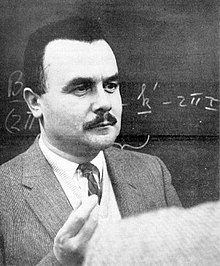Bertram Brockhouse
Bertram Brockhouse | |
|---|---|
 Brockhouse in front of a blackboard | |
| Born | Bertram Neville Brockhouse July 15, 1918 Lethbridge, Alberta, Canada |
| Died | October 13, 2003 (aged 85) Hamilton, Ontario, Canada |
| Alma mater | |
| Known for | Neutron triple-axis spectrometry |
| Awards |
|
| Scientific career | |
| Institutions | McMaster University |
| Thesis | The effect of stress and temperature upon the magnetic properties of ferromagnetic materials (1950) |
| Doctoral advisor | James Reekie |
| Doctoral students | Sow-Hsin Chen |
| Website | www |
Bertram Neville Brockhouse, CC FRSC FRS (July 15, 1918 – October 13, 2003)[1] was a Canadian physicist. He was awarded the Nobel Prize in Physics (1994, shared with Clifford Shull) "for pioneering contributions to the development of neutron scattering techniques for studies of condensed matter", in particular "for the development of neutron spectroscopy".[2][3][4]
Education and early life
[edit]Brockhouse was born in Lethbridge, Alberta, to a family of English descent.[5] He was a graduate of the University of British Columbia (BA, 1947) and the University of Toronto (MA, 1948; Ph.D, 1950).[6][7]
Career and research
[edit]From 1950 to 1962, Brockhouse carried out research at Atomic Energy of Canada's Chalk River Nuclear Laboratory. Here he was joined by P. K. Iyengar, who is treated as the father of India's nuclear program.
In 1962, he became a professor at McMaster University in Canada, where he remained until his retirement in 1984.
Brockhouse died on October 13, 2003, in Hamilton, Ontario, aged 85.
Awards and honours
[edit]Brockhouse was elected a Fellow of the Royal Society (FRS) in 1965.[1] In 1982, Brockhouse was made an Officer of the Order of Canada and was promoted to Companion in 1995.
Brockhouse shared the 1994 Nobel Prize in Physics with American Clifford Shull of MIT[8] for developing neutron scattering techniques for studying condensed matter.
In October 2005, as part of the 75th anniversary of McMaster University's establishment in Hamilton, Ontario, a street on the university campus (University Avenue) was renamed to Brockhouse Way in honour of Brockhouse. The town of Deep River, Ontario, has also named a street in his honour.
The Nobel Prize that Bertram Brockhouse won (shared with Clifford Shull) in 1994 was awarded after the longest-ever waiting time (counting from the time when the award-winning research had been carried out).
In 1999 the Division of Condensed Matter and Materials Physics (DCMMP) and the Canadian Association of Physicists (CAP) created a medal in honour of Brockhouse. The medal is called the Brockhouse Medal and is awarded to recognize and encourage outstanding experimental or theoretical contributions to condensed matter and materials physics. This medal is awarded annually on the basis of outstanding experimental or theoretical contributions to condensed matter physics. An eligible candidate must have performed their research primarily with a Canadian Institution.
References
[edit]- ^ a b Cowley, R. (2005). "Bertram Neville Brockhouse. 15 July 1918 - 13 October 2003: Elected F.R.S. 1965". Biographical Memoirs of Fellows of the Royal Society. 51: 51–65. doi:10.1098/rsbm.2005.0004.
- ^ science.ca profile of Bertram Brockhouse
- ^ Brockhouse biographical details from nobelprize.org
- ^ Office of the Governor General of Canada. Order of Canada citation. Queen's Printer for Canada. Retrieved 24 May 2010
- ^ Cowley, Roger (2005). "Bertram Neville Brockhouse. 15 July 1918 – 13 October 2003: Elected F.R.S. 1965". Biographical Memoirs of Fellows of the Royal Society. 51: 51–65. doi:10.1098/rsbm.2005.0004. ISSN 0080-4606.
- ^ Brockhouse, Bertram Neville (1950). The effect of stress and temperature upon the magnetic properties of ferromagnetic materials (PhD thesis). University of Toronto. OCLC 222041304.
- ^ "Brockhouse and the Nobel Prize - Canadian Neutron Beam Centre". neutron.nrc-cnrc.gc.ca. Archived from the original on 2009-02-17. Retrieved 2008-06-02.
- ^ "Clifford G. Shull, co-winner of 1994 Nobel Prize in physics, is dead at 85". MIT-News. Massachusetts Institute of Technology. 2001-04-02. Archived from the original on 2012-05-22. Retrieved 2010-12-27.
Professor Shull shared the 1994 Nobel Prize with Professor Bertram S. Brockhouse of McMaster University, Hamilton, Ontario, Canada.
External links
[edit]- Bertram Brockhouse, the Triple-axis Spectrometer, and Neutron Spectroscopy , from the Office of Scientific and Technical Information, United States Department of Energy
- Bertram N. Brockhouse on Nobelprize.org including the Nobel Lecture, December 8, 1994 Slow Neutron Spectroscopy and the Grand Atlas of the Physical World
- 1918 births
- 2003 deaths
- Scientists from Lethbridge
- Spectroscopists
- Canadian nuclear physicists
- University of Toronto alumni
- University of British Columbia Faculty of Science alumni
- Academic staff of McMaster University
- Nobel laureates in Physics
- Canadian Nobel laureates
- Fellows of the Royal Society of Canada
- Fellows of the American Physical Society
- Companions of the Order of Canada
- Canadian fellows of the Royal Society
- Oliver E. Buckley Condensed Matter Prize winners
- 20th-century Canadian scientists
- Members of the Royal Swedish Academy of Sciences

